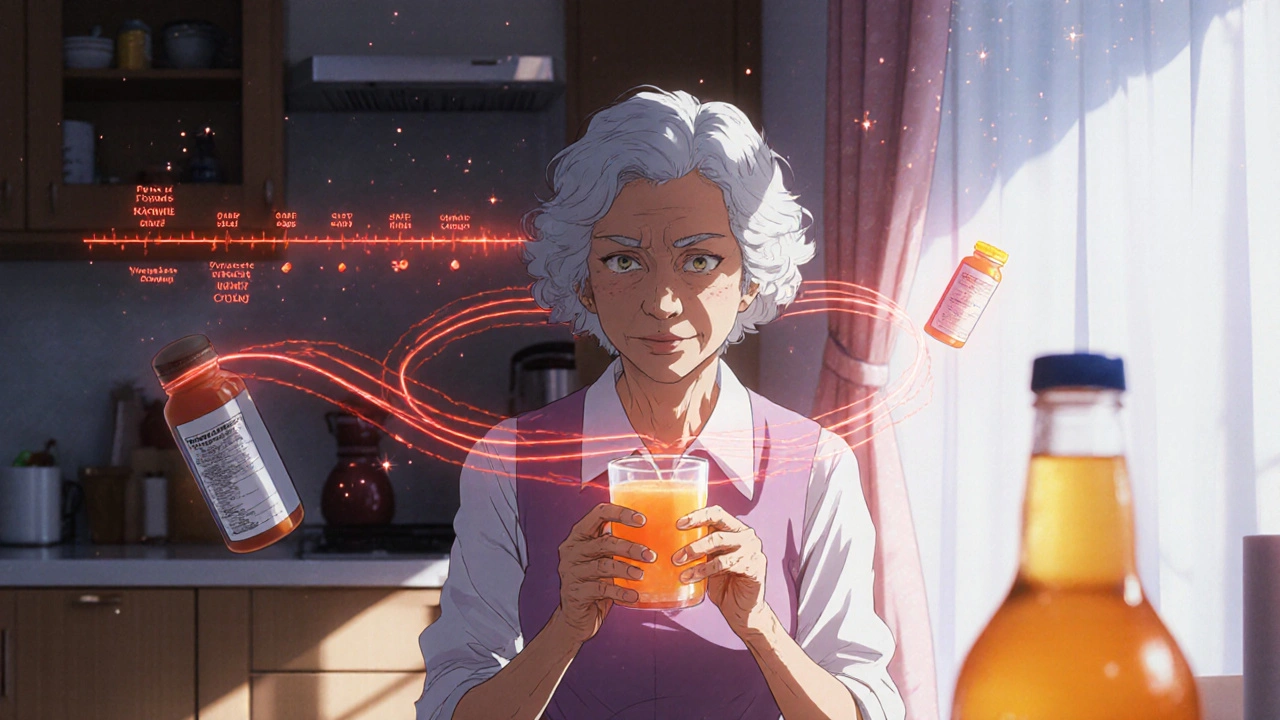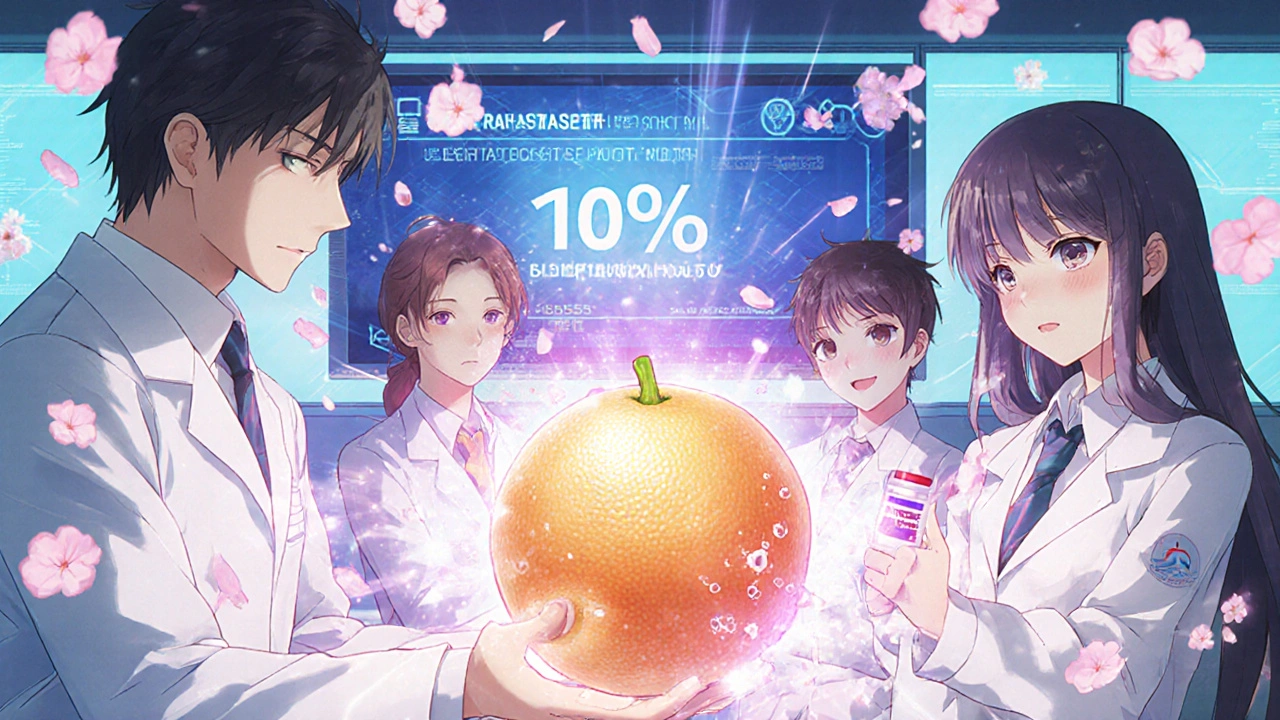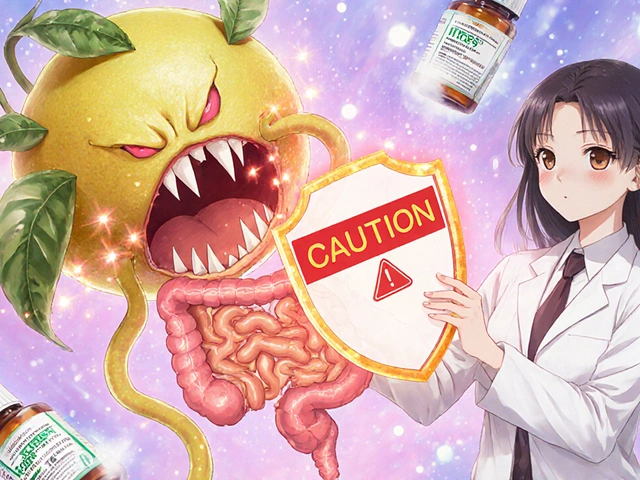Medication-Grapefruit Interaction Checker
Check Your Medication
Enter your medication name to see if it interacts dangerously with grapefruit or related citrus fruits
Key Information
Why This Matters
Grapefruit contains furanocoumarins that block the CYP3A4 enzyme in your gut, preventing proper drug metabolism. This can cause dangerous drug levels to build up in your bloodstream.
Critical fact: The enzyme-blocking effect lasts 24-72 hours - timing your medication doesn't help!
What To Do
If your medication interacts dangerously with grapefruit:
- Avoid grapefruit, Seville oranges, pomelos, and related citrus completely
- Ask your pharmacist about safer alternatives
- Never assume "just a little" is safe
- Check prescription labels for FDA warnings
One glass of grapefruit juice in the morning might seem like a healthy habit-until it turns dangerous. For people taking certain medications, that refreshing citrus drink can trigger serious, even life-threatening side effects. It’s not about sugar or acidity. It’s about a silent chemical war happening inside your gut, where grapefruit quietly disables your body’s ability to process drugs safely. This isn’t a myth. It’s science-and it affects thousands of people every year.
Why Grapefruit Changes How Your Medicines Work
Grapefruit doesn’t just mix with drugs-it rewires how your body handles them. The culprit? Furanocoumarins, natural chemicals found in grapefruit, especially in the peel and pulp. These compounds don’t just disappear after you swallow them. They latch onto an enzyme in your small intestine called CYP3A4, which normally breaks down dozens of medications before they enter your bloodstream. Once the enzyme is blocked, your body can’t process the drug properly. The result? Too much drug builds up in your blood, turning a safe dose into a toxic one.
Unlike alcohol or food that you can time around your pills, grapefruit’s effect lasts for days. The enzyme doesn’t just slow down-it gets destroyed. Your body has to grow new enzymes to replace them, which takes 24 to 72 hours. That means even if you take your medication at night and drink grapefruit juice in the morning, you’re still at risk. There’s no safe window. The only reliable way to avoid danger is to stop eating or drinking grapefruit entirely while on affected drugs.
Medications That Can Become Dangerous with Grapefruit
More than 85 medications are known to interact with grapefruit, and about 43 of them can cause serious harm. The most common categories include statins, blood pressure drugs, and immunosuppressants.
Statins-used to lower cholesterol-are among the most affected. Simvastatin (Zocor) is the worst offender. Just 200 milliliters (about 6.7 ounces) of grapefruit juice, taken daily for three days, can triple the amount of simvastatin in your blood. That spikes your risk of rhabdomyolysis, a condition where muscle tissue breaks down and floods your kidneys with harmful proteins. Lovastatin (Mevacor) behaves similarly, with some studies showing over 1,500% higher drug levels. Atorvastatin (Lipitor) also increases by 80%, but pravastatin (Pravachol) and rosuvastatin (Crestor) are safe because they use different metabolic pathways. If you’re on a statin and love grapefruit, ask your doctor if switching to one of the safer options is possible.
Calcium channel blockers, used for high blood pressure and chest pain, are another major concern. Felodipine (Plendil) can see its blood levels jump by 355% after grapefruit consumption. Nifedipine (Procardia) rises by 274%, and amlodipine (Norvasc) by 150%. These spikes can cause dangerously low blood pressure, dizziness, fainting, or even heart rhythm problems. Some drug manufacturers, like Pfizer, have tried to reduce the risk by reformulating nifedipine as Adalat CC, but even that version isn’t completely safe.
Immunosuppressants are where things get life-threatening. Drugs like cyclosporine (Sandimmune), tacrolimus (Prograf), and sirolimus (Rapamune) are critical for transplant patients. Grapefruit can push their blood levels up by 50% to over 1,100%. That means a higher risk of kidney damage, severe infections, high blood pressure, and even organ rejection. For someone who’s had a heart or liver transplant, this isn’t just inconvenient-it’s potentially fatal.
Other Fruits and Juices That Act the Same Way
Grapefruit isn’t alone. Seville oranges (the bitter kind used in marmalade), pomelos, and even some limes contain the same furanocoumarins. If your recipe calls for Seville orange marmalade and you’re on a statin or blood pressure med, that’s just as risky as grapefruit juice. Regular sweet oranges (like navel or Valencia) and tangerines are safe-they don’t contain the same compounds. Pomegranate juice has also been linked to similar interactions in rare cases, though the evidence isn’t as strong yet.
Even grapefruit-flavored sodas, candies, or supplements can contain enough of these chemicals to cause problems. Don’t assume something labeled "grapefruit flavor" is safe. Always check the ingredient list for real grapefruit juice or extract.

Who’s Most at Risk?
Older adults are the most vulnerable group. In the U.S., over half of people aged 65 and older take five or more prescription drugs daily. Many of these drugs are on the grapefruit interaction list. And because older people often eat healthier diets-including citrus fruits-they’re more likely to be consuming grapefruit while on risky medications.
It’s not just about age. Genetics play a role too. Some people carry a variation in the CYP3A4 gene (called CYP3A4*22) that makes them more sensitive to grapefruit’s effects. Studies show these individuals can experience up to 40% higher drug levels than others. But there’s no routine test for this, so everyone on affected medications should assume they’re at risk.
What Should You Do?
If you’re on medication, here’s what to do right now:
- Check your prescription label. The FDA requires grapefruit interaction warnings on 17 specific drugs, including simvastatin, felodipine, and cyclosporine. Many others mention it in the prescribing information.
- Ask your pharmacist. Pharmacists screen for grapefruit interactions in nearly 80% of medication reviews. They’re trained to catch this. Don’t assume your doctor told you-ask your pharmacist directly.
- Ask three questions: Does my drug interact with grapefruit? How much, if any, can I safely have? Are there other fruits or juices I should avoid?
- Consider alternatives. For statins, switch to pravastatin or rosuvastatin. For blood pressure, diltiazem or lisinopril are safer options. For immunosuppressants, there are no easy swaps-but your doctor can adjust your dose or monitor you more closely.
- Don’t rely on timing. Waiting a few hours between juice and pills won’t help. The enzyme damage lasts for days.

What Happens If You Accidentally Mix Them?
If you’ve had grapefruit juice while on a risky medication, watch for signs of overdose: muscle pain or weakness (especially with statins), sudden dizziness or fainting (with blood pressure drugs), swelling in your feet or hands, unusual fatigue, or dark urine. These can signal muscle breakdown or kidney stress. Call your doctor or go to urgent care if you notice these symptoms. Don’t wait.
Most people who accidentally mix grapefruit and medication don’t have immediate problems. But the risk builds over time. One glass a week might seem harmless-but if you’ve been doing it for months, your body could be carrying a dangerous drug load without you knowing.
Is There Any Hope for the Future?
Scientists are working on solutions. Researchers are developing grapefruit varieties with 85-90% less furanocoumarin through selective breeding. Early trials show promise, but these aren’t available to the public yet. Meanwhile, electronic health records now include automated alerts for grapefruit-drug interactions in over 90% of U.S. hospitals. Pharmacists are better trained. Prescribing guidelines are clearer.
But until safer grapefruit hits the shelves, the rule stays simple: if your drug interacts with grapefruit, avoid it completely. No exceptions. No "just a little." Your life could depend on it.
Can I drink orange juice instead of grapefruit juice if I’m on medication?
Yes, regular sweet orange juice-like navel or Valencia-is safe. It doesn’t contain furanocoumarins, the compounds that interfere with medications. But avoid Seville oranges, pomelos, and lime juice, as they can have the same dangerous effects as grapefruit. Always check the label if you’re unsure.
Does grapefruit affect all statins the same way?
No. Simvastatin and lovastatin are highly affected-grapefruit can triple or even increase their levels by over 1,500%. Atorvastatin is moderately affected, with levels rising by about 80%. But pravastatin and rosuvastatin are not metabolized by the CYP3A4 enzyme, so they don’t interact with grapefruit. If you’re on a statin and love grapefruit, ask your doctor about switching to one of these safer options.
How long does grapefruit stay in my system and affect my meds?
The enzyme-blocking effect lasts 24 to 72 hours after you drink grapefruit juice. That’s because the furanocoumarins permanently destroy CYP3A4 enzymes in your gut. Your body needs to make new ones, which takes days. That’s why timing your juice and pills doesn’t work. Even if you drink grapefruit juice at breakfast and take your pill at night, you’re still at risk.
Are there any medications that are safe with grapefruit?
Yes. Many common drugs are unaffected, including metformin (for diabetes), levothyroxine (for thyroid), and most antibiotics like amoxicillin. Blood thinners like apixaban (Eliquis) and rivaroxaban (Xarelto) don’t interact with grapefruit, unlike warfarin. But because hundreds of drugs are affected, never assume yours is safe. Always check with your pharmacist or doctor.
Can I eat grapefruit if I only take my medication once a week?
No. Even if you take your medication infrequently, grapefruit’s effect on your gut enzymes lasts for days. So if you drink grapefruit juice on Monday, your body is still unable to properly process your drug on Wednesday or Thursday. The interaction isn’t tied to timing-it’s tied to enzyme damage. The only safe approach is complete avoidance.


Brittany C
November 13, 2025 AT 19:40Grapefruit juice is basically a silent saboteur in your gut. CYP3A4 gets nuked, and suddenly your statin turns into a chemical bomb. I didn’t realize the enzyme destruction lasted DAYS. No wonder my uncle ended up in the ER after "just one glass." I switched to orange juice and never looked back. Seriously, if your med label says "avoid grapefruit," just listen. No exceptions.
Also, fun fact: Seville orange marmalade? Same deal. My British roommate put it on toast with her blood pressure med. We had to have a talk. 😅
Sean Evans
November 15, 2025 AT 13:13Ugh. Another "be careful with your meds" PSA. People are so lazy they can’t even read the damn label. If your pharmacist didn’t warn you, you’re either not paying attention or your doctor is garbage. I’ve been on simvastatin for 8 years. NEVER touched grapefruit. Not even a sniff. Why? Because I’m not an idiot. And yet, here we are-another post telling adults how to live. 🤦♂️
Also, if you’re 65 and still drinking grapefruit juice with 5 meds? You’re a walking liability. Get your act together.
PS: Pomegranate juice? Probably fine. Stop overreacting. 🍇❌💊
Anjan Patel
November 15, 2025 AT 17:09Oh my GOD. I just realized-I’ve been drinking grapefruit juice every morning for 7 years while taking my blood pressure pills. 7 YEARS. I thought it was healthy. I thought it was clean. I thought it was… spiritual. And now? My kidneys might be staging a rebellion. I’m not crying. I’m not crying. I’m just… sitting here. Staring at my glass. Wondering if my body has already started eating itself from the inside out. 😭
My mom used to say, "Food is medicine." Well, grapefruit? It’s a Trojan horse. And I fell for it. Hard.
Update: I just threw out my entire citrus basket. I’m going to drink water. Like a monk. A very scared monk.
Scarlett Walker
November 17, 2025 AT 11:43Y’all, this is such a wake-up call. I used to love grapefruit juice like it was liquid sunshine. But now? I’m switching to apple juice. Or better yet-water with lemon (sweet lemon, not Seville!).
My grandma’s on a statin and she’s 78. She’s gonna be fine because we’re gonna have a little chat tonight. No more grapefruit. Ever. 💪
Also, shoutout to pharmacists-they’re the real MVPs. Don’t skip asking them. They know stuff your doctor might not have time to say. ❤️
Hrudananda Rath
November 17, 2025 AT 17:19One is compelled to observe, with a certain degree of academic dismay, the pervasive ignorance surrounding pharmacokinetic interactions in the lay population. The CYP3A4 enzyme, a pivotal component of the xenobiotic metabolic cascade, is rendered functionally inert by furanocoumarins-a class of secondary plant metabolites, not merely "chemicals" as the article redundantly describes them. The casual dismissal of timing protocols, the failure to distinguish between metabolic pathways, and the conflation of flavoring agents with bioactive constituents reflect a troubling epistemic deficit in public health literacy.
One must therefore conclude: the responsibility for pharmaceutical safety rests not with the physician, but with the individual who, through ignorance or negligence, chooses to consume a citrus fruit known since the 1980s to induce clinically significant drug accumulation. The tragedy is not the grapefruit. The tragedy is the human mind.
-Hrudananda Rath, Ph.D. (Pharmacology, Oxford)
Brian Bell
November 18, 2025 AT 07:06Bro. I just checked my meds. Felodipine. Oh no. 😱
That’s the one that jumps 355% with grapefruit. I’ve been drinking it every day since January. I think I just aged 10 years in 3 seconds.
Switching to orange juice right now. And maybe a nap. And possibly a therapist. 🍊➡️🍊
Also, if you’re on anything and you’ve had grapefruit-DM me. We can panic together.
Nathan Hsu
November 19, 2025 AT 03:37Let me clarify, with precision: grapefruit juice does not "mix" with drugs-it chemically inhibits the intestinal CYP3A4 isoenzyme, thereby reducing first-pass metabolism, increasing bioavailability, and elevating plasma concentrations beyond therapeutic thresholds. This is not a "warning," it is a biochemical reality. Furthermore, the claim that "timing" mitigates risk is not merely incorrect-it is dangerously misleading. The enzyme inactivation is irreversible; regeneration requires 72 hours. Therefore, consumption at any point within this window constitutes a pharmacological hazard. Please, for the love of science, stop treating this like a dietary preference. It is not. It is a metabolic trap.
-Nathan Hsu, M.S. Clinical Pharmacology
Ashley Durance
November 20, 2025 AT 03:26People who don’t read their medication guides are just asking for trouble. And yet, somehow, they always act shocked when something bad happens. "Oh, I didn’t know!" Well, you should’ve known. You have a phone. You have a pharmacist. You have Google.
Also, "grapefruit-flavored soda"? That’s not even real grapefruit. It’s artificial flavoring. Unless it says "natural grapefruit extract," it’s probably fine. But you still shouldn’t trust it. You’re the problem, not the juice.
And yes, I know someone who died from this. It wasn’t pretty. Don’t be that person.
kshitij pandey
November 22, 2025 AT 01:06Hey everyone, just wanted to say-this is super important, but don’t panic! I’m from India, and we don’t drink much grapefruit juice here, but I’ve seen friends on blood pressure meds get scared and stop eating fruit altogether. That’s not the answer!
Just switch to sweet orange, guava, or papaya. Safe, tasty, and no risk. And if you’re unsure? Ask your pharmacist. They’ll help you. No judgment.
Also, if you’re older and on multiple meds-your family can help you check labels. We’re all in this together. ❤️
Scott Saleska
November 22, 2025 AT 16:31Just to be clear-I’m not saying you’re wrong, but have you considered that maybe your body is fine? I mean, I’ve had grapefruit juice with my meds for 12 years. No issues. Maybe the 85-drug list is overblown? Maybe it’s just a few outliers? I’m not trying to be a contrarian-I just think people get too scared of food. We’ve been eating citrus for centuries. Maybe the real problem is overmedication?
Also, I tried switching to orange juice, but it’s just… bland. I miss the tang.
Ryan Anderson
November 23, 2025 AT 05:46So I just read this article and immediately checked my pill bottle. Yep-simvastatin. 😳
Threw out my entire grapefruit stash. No regrets.
Also, I’ve been telling my mom for months to stop drinking it with her blood pressure med. She said, "But it’s healthy!" Now she’s switching to apple cider vinegar water. I’m not even joking. She’s a warrior.
Thanks for the education. This is the kind of post that saves lives. 💪🍊🚫
Eleanora Keene
November 24, 2025 AT 18:25Okay, I’m not a doctor, but I’ve been reading up on this since my dad got diagnosed with high cholesterol. And honestly? This is the clearest, most helpful thing I’ve seen. I printed it out and gave it to him. He’s 72 and takes five meds. He didn’t even know grapefruit could do this.
Now he’s drinking cranberry juice instead. And he says it tastes like victory. 🎉
Also-thank you to the pharmacist who actually took the time to explain this to him last week. Not all of them do. You’re heroes.